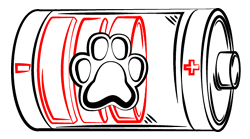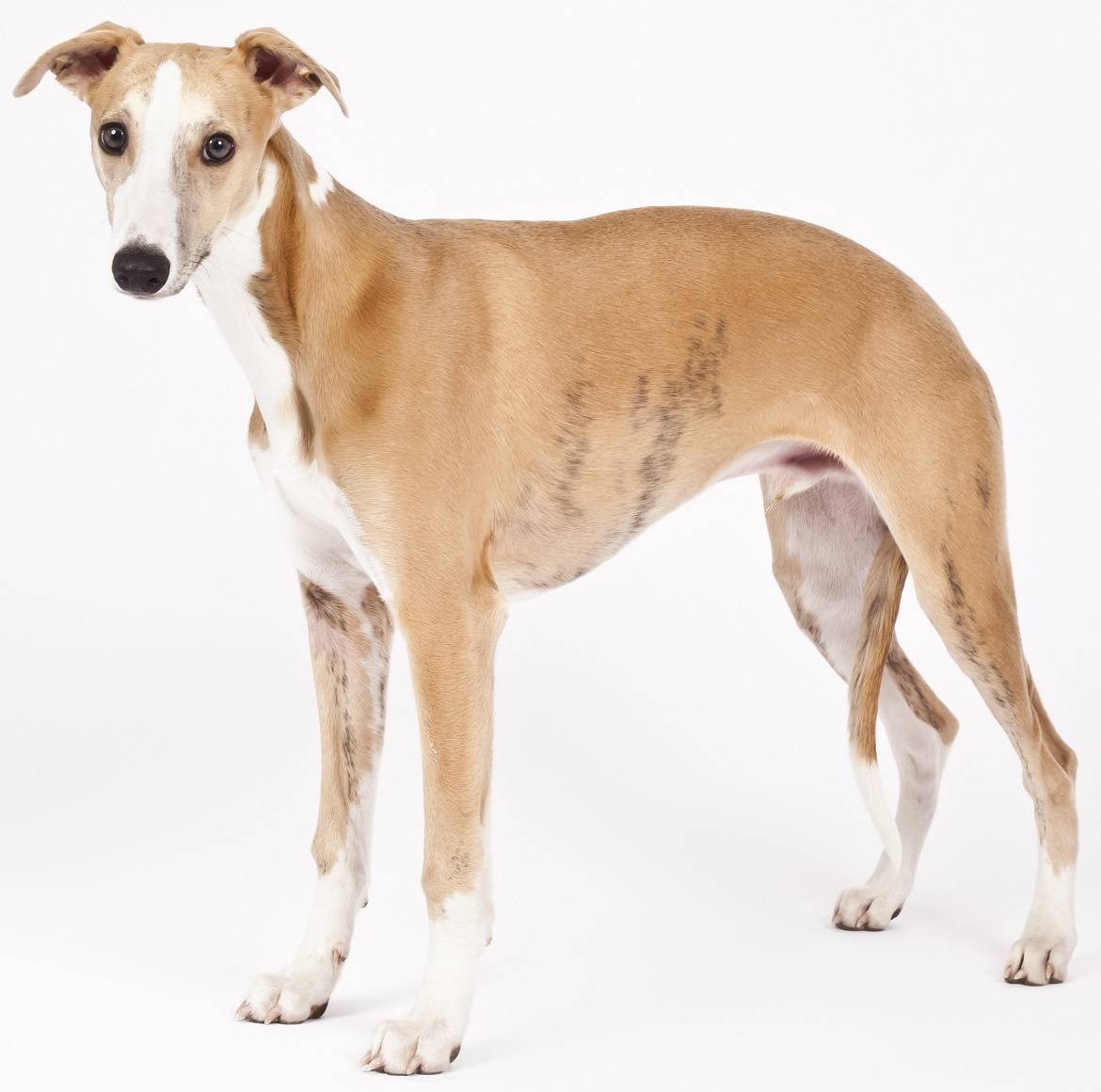
Paws ‘N’ Pups Quickview
Size
| Energy Level
| Trainability
| Paws ‘N’ Pups Rank
|
Characteristics
| Physical Characteristics: Height: 18-22” Weight: 15-34 lbs. Energy Level: Moderate – High | Colors: The American Kennel Club recognizes the Whippet in the following colors:
|
Health & Longevity
Average Life Span: 12-15 years
Whippets are mid-sized, quick purebreds with abundant energy and overall good health. However, that good health usually begins to deteriorate in the later years of this pup’s life, as there are many health issues that plague this breed. Both serious and minor alike.
Plus, Whippets are still prone to the usual health conditions that any pup of any breed could suffer from, such as parvo, heart disease, and heartworms. Your Whippet is likely to have very good health throughout their puppy stage and middle age, but 9-10 years old is considered senior. This is when health problems become prominent.
Vitreous Degeneration
This genetic disorder is usually seen in tandem with progressive retinal atrophy. The entirety of the retina and vitreous are affected, resulting in degeneration and gradual vision loss. This disease is incurable, but you can re-train your dog to cope with eventual blindness. The degeneration is painless.
Fibrocartilaginous Embolism
Also known as a Spinal Cord Stroke, this condition is caused when cartilage fibers block the vertebrae, cutting off blood supplies to parts of the spinal cord. If left untreated, parts of the spine will die, resulting in severe pain and paralysis. Surgery is often required, but rehabilitation and physical therapies are lifelong efforts.
Other health conditions that could be a problem that your Whippet include skin allergies, pyoderma, demodectic mange, color dilution alopecia, lens luxation, cherry eyes, glaucoma, cataracts, and obesity-related issues. Whippets, on average, have a lengthy life that ranges from 12 to 15 years.
Temperament & Train-ability
Commonly docile and affectionate, Whippets are a sensitive breed. Several of them will suffer from small dog syndrome, making them territorial towards children, other dogs, and strangers. However, this is easily trained out of them with patience, determination, and a dominant, clear tone in a positive, kind voice. Training sessions for Whippets need to be all about positivity, as these pups do not respond well to harshness or physical force. Never, ever strike or yell at your Whippet. Training might be slow, but you will get there.
Exercise-wise, the Whippet is an energetic pup that was originally bred to be a hunter’s companion. These dogs are speedy, alert, and loyal. They may have problems with small animals since that is what their breed was made for, but they would do well with other dogs if you wanted to visit a dog park for exercise. For better results, socialize your Whippet as a puppy so he can learn acceptance and tolerance of others. You should also take him for a couple of walks per day, around 30 minutes each time.
Grooming
Whippets have short, smooth coats that are easily managed with once-a-week brushes. These pups are moderate shedders, so ramp up the brushing to 3-4 times a week in the summer months. These purebreds do okay in moderate temperatures but fare worse in severe weather conditions in either direction.
Bathe your Whippet once a month or whenever your pup gets really dirty. Whichever comes first. Just remember that your Whippet has important natural oils on his coat that protect his skin from infections and allergic reactions. Bathing him too often will wash away these oils, exposing his skin to the dangers of harmful bacteria.
Other basic care needs for your Whippet include brushing his teeth daily, cleaning his ears once a week with warm water or a vet-prescribed cleaning solution and a cotton swab, and clipping his toenails every 2-3 weeks.
Diet
Whippets are energetic, fast pups who need lots of nutrients to fuel their bodies. Divide 2 ½ cups of dry, high-quality kibble into two meals per day, preferably once in the A.M. and once in the P.M.
Whippets have sensitive stomachs, so it is important to feed them a nutritious diet of whole grains, lean meats, and vet-approved veggies. Ask your vet what she would recommend brand-wise, since there is an abundance of bad kibble choices on the market. Your Whippet needs plenty of protein, fiber, good fats, and complex carbs, so keep that in mind when searching for the perfect dog food to meet his nutritional needs.
Looking for a Whippet?
 Find A Whippet Breeder |  Whippet Puppies For Sale |  Adopt A Whippet |
Cost
Whippet puppies are in high demand because of their sleek appearance, energetic nature, and overall good health throughout their puppy and middle years. Pet owners who invest their time and energy into a Whippet usually have the means to take care of these pups long-term. However, life happens, and sometimes pet owners are forced to abandon their Whippets to make ends meet. For this reason, you should search out your new companion at a local animal shelter before looking for a breeder.
Animal shelters are rarely the place people want to go to retrieve their purebred companion, but you might be surprised at what kind of pup you’ll find. Plus, all of the dogs there need love and a forever home; one that you could provide for them. You could also call ahead to ask if they have any Whippets up for adoption. In which case, fees would range from $75 to $250, depending on the state and county regulations. Vaccinations, spay or neuter services, and a health check would push the fee up to around $500.
If you opt to find a breeder, Whippet puppies cost between $800 to $1,500 for the dog itself. Factor in the price of, both short-term and long-term, toys, wholesome kibble, vaccinations, vet check-ups, medical emergencies, a microchip, a leash and collar, and other necessities. When all is said and done, you are spending around $2,300 for a brand new Whippet pup.
Paws ‘N’ Pups Ranking
Paws ‘N’ Pups ranks every breed out of 4 with 1 being easiest to integrate into your life and 4 being the toughest – The lower the ranking the better.
Ranking takes into account a few basic factors including cost, skill level needed, high vs low maintenance and how critical regular training is to success.The Whippet is a 1.5 on the integration scale. These pups can be a bit territorial, and many of them suffer from small dog syndrome, so he will try to challenge your authority. If you can keep an even temper, a level head, and patience, training your Whippet should be no problem. These dogs respond well to praise and positive training methods. Eventually, you will have a well-behaved, well-trained, affectionate family dog.
Breeds Similar To Whippet
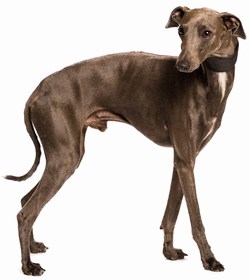 Greyhound | 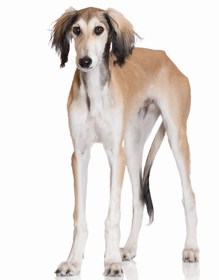 Saluki | 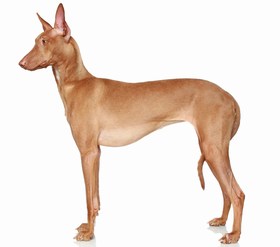 Pharaoh Hound | 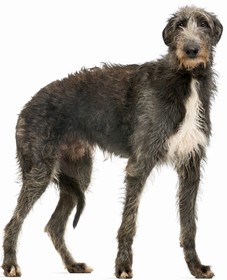 Scottish Deerhound |


